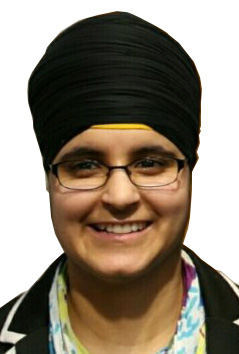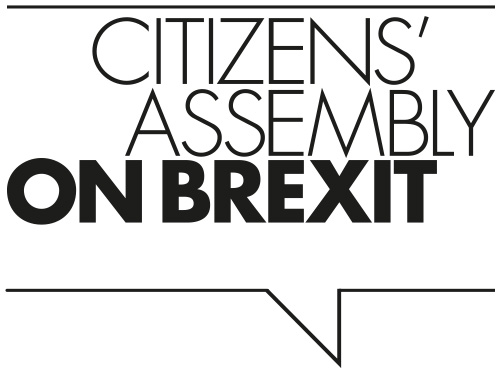Resources
Photo (c) Cade Hannan.
The Citizens’ Assembly on Brexit took place over two weekends in September 2017, bringing people together and broadly representing the electorate of the United Kingdom.
The Citizens’ Assembly on Brexit allows members to engage in detailed, reflective and informed discussions about what the UK’s post-Brexit relations with the European Union should be. The project is led by the Constitution Unit at UCL, supported by a range of partners and funders listed below.
The members, who were selected to reflect the diversity of the UK’s electorate, spent the weekends learning from a range of experts across the leave/remain spectrum about the different options and trade-offs involved in leaving the EU. The members deliberated and agreed on recommendations for what form of Brexit the UK government should pursue.
Citizens’ assemblies are deliberative democratic mechanisms that are designed to improve decision-making by allowing informed and considered public opinion to be heard on major policy questions. Other similar bodies have operated in parts of Canada – notably British Columbia and Ontario – and there is a citizens’ assembly currently operating in Ireland. Two pilot citizens’ assemblies took place in parts of the UK in 2015 on the topic of devolution.
Citizens’ assemblies emphasise two important areas of democracy: the participation of ordinary citizens in decision-making; and careful, thoughtful discussion of the arguments for and against different options. The Citizens’ Assembly on Brexit built on experiences in earlier assemblies to yield – we hope – thoughtful discussions and reasoned conclusions.
The Assembly’s recommendations are set out in the full report and the summary report.
Aims
- To provide an opportunity for lively, informed and considered discussion among members of the public about the kind of Brexit that the UK should be seeking.
- To encourage discussion of the same issues among the wider public.
- To provide a robust source of evidence on the informed and considered views of members of the public as to the form that Brexit should take, thereby helping those involved in negotiating Brexit or in holding the negotiators to account.
- To test the viability of deliberative techniques on a high-profile and relatively polarised topic.
Who were the members?
The members were found through a UK-wide representative survey, conducted by ICM, and then contacted by phone. The recruitment followed a stratification plan, with the aim of securing a broadly representative sample reflecting the UK electorate across characteristics such as whether they voted Leave or Remain, their gender, ethnicity, social class and the region of the UK in which they live.
Direct applications to participate in the Citizens’ Assembly were not permitted, as we would not be able to ascertain that applicants are representative of the broader public.
Members were paid full travel and hotel expenses and, as a token of thanks for their contribution to the Assembly, an additional £200 per weekend. Such payments reflect the great commitment made by Assembly members, who gave up two weekends and in some cases travelled great distances in order to take part.
Further details of the recruitment methodology are available in the full report.
Project Funding
The Citizens’ Assembly project is part of the UK in a Changing Europe initiative, funded by the Economic and Social Research Council (ESRC).
The UK in a Changing Europe initiative, directed by Professor Anand Menon of King’s College London, exists to provide an authoritative, non-partisan and impartial reference point for those looking for information, insights and analysis about UK–EU relations.
The ESRC is the UK’s largest organisation funding social and economic research. This non-departmental public body (NDPB) supports independent, high quality research with impact ranging across business, the public sector and civil society.
Bernard Jenkin MP
 Bernard Jenkin MP
Bernard Jenkin MP
Conservative,
Harwich and North Essex
“I was a long-term critic of European political and monetary union, and opposed Maastricht and the subsequent treaties on the basis that the EU lacked democratic legitimacy, transparency and accountability. I supported calls for a referendum on the UK’s membership of the EU, and helped set up Vote Leave. At the same time, I was Chair of PACAC (the Commons Public Administration and Constitutional Affairs Committee) who’s mission is “to conduct robust and effective scrutiny in order to help create conditions where the public can have justified confidence in public services/ government”. This is why I am delighted to support this Citizens’ Assembly on Brexit – where people will be given a chance to discuss the best way for the UK to leave the European Union.”
Professor Anand Menon
 Professor Anand Menon,
Professor Anand Menon,
Director of the UK in a Changing Europe initiative,
Professor of European Politics and Foreign Affairs at Kings College London
“The nature of Brexit is the biggest choice facing the country today. Ensuring the public have a voice in the debate is vital. The Citizens’ Assembly on Brexit will do crucial work to help make that happen. I’m delighted to support you and I look forward to participating in your work.”
Stephen Kinnock MP
 Stephen Kinnock MP
Stephen Kinnock MP
Labour, Aberavon
"The referendum on the UK's membership of the European Union failed to enable the diversity of British opinion to be heard. Now that Article 50 has been triggered, it is vital that we do not make the same mistake again. This Citizens' Assembly project will make an essential contribution to enabling a constructive and productive national conversation about how we can best move forward, together."
John Mills
 John Mills
John Mills
Chair Labour Leave
"As Chair of the ‘Labour Leave’ campaign, I am pleased to support the work being undertaken by the Citizens’ Assembly on Brexit. The Citizens’ Assembly has, I believe, a great capacity to add something that it is too often missing from our political debate – the voice of citizens. I fully trust this process will be done in a way that is both inclusive of a variety of voices but at the same time can offer some concrete solutions to how best to disentangle ourselves from the European Union."
Chuka Umunna MP
 Chuka Umunna MP,
Chuka Umunna MP,
Labour, Streatham
"As the representative of the most ‘Remain’ constituency in Britain and chair of Vote Leave Watch, I am a firm believer in the benefits of a close relationship with our European partners. And I also think that rather than pursuing a recklessly hard Brexit, this government needs to listen to what the people want and a citizens’ assembly is a great way of doing this. I am happy to support projects like this that attempt to bridge the great divides in British society."
Harsimrat Kaur
 Harsimrat Kaur,
Harsimrat Kaur,
Founding Supporter of Change Britain
“This is an exciting initiative that will give citizens the chance to get to grips with the detail of Brexit negotiations for themselves – rather than leave it to the politicians. Our immigration system, religious freedom and human rights are all areas that deserve close attention, as we prepare for Britain’s exit. As a passionate supporter of leaving the EU, I am delighted to see a project that will encourage citizens to look ahead and share their ambitions for post-Brexit Britain.”
Will Straw
 Will Straw
Will Straw
Executive Director,
Britain Stronger in Europe
“Britain Stronger in Europe was the cross-party umbrella group that led the Remain campaign. As its executive director, I’m pleased to see a process like this which can bring the views of citizens to life as we move towards Brexit. Important decisions are going to be taken about our future and it’s right we involve citizens every step of the way.”
Nicky Morgan MP
 Nicky Morgan MP
Nicky Morgan MP
Conservative,
Loughborough
“Leaving the EU will have a great effect on the lives of the British people and I know from the conversations I have had with my own constituents as the Member of Parliament for Loughborough, that people want to have their say on the terms of our withdrawal and our future partnership with the EU.
Whilst, of course, MPs are able to represent their constituent’s views in Parliament, it is important that the public also have an opportunity to learn more about the options for Brexit from leading experts and campaigners, and discuss their ideas with their peers. Therefore, I am delighted to support the Citizens' Assembly on Brexit.”








